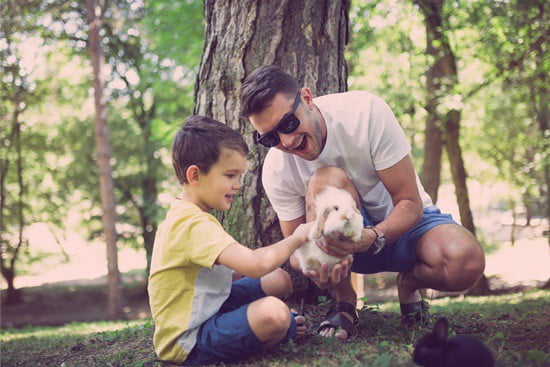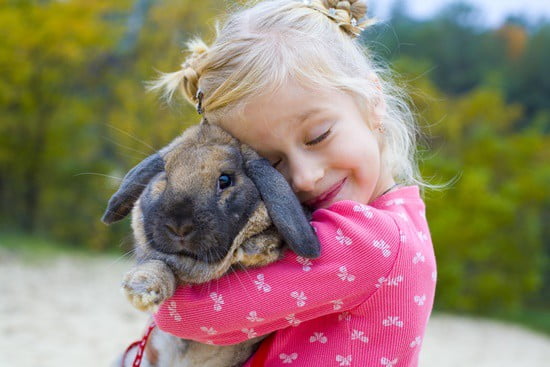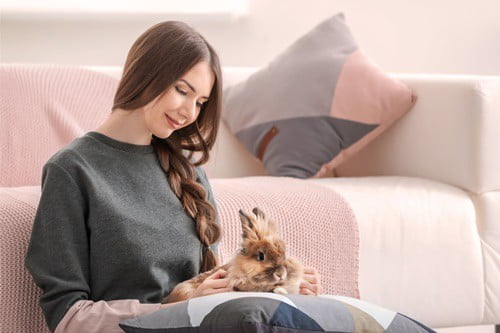Rabbits are not verbal, and it takes a while to understand their body language. As a result, we often wonder what goes through a rabbit’s mind, and wonder if our pet rabbit loves us or not.
A rabbit approaching a human is a sign of love. As rabbits are prey animals, they’re afraid of us. If your pet grooms you, she adores you. If she sleeps near you, she loves and trusts you unreservedly.
While every rabbit has a unique personality, most rabbits are affectionate by nature. You need to earn the love and trust of a rabbit based on the things you do for them each day.
Are Rabbits Affectionate Pets?
Rabbits are capable of being loving, affectionate pets. Rabbits are also capable of being moody and unruly. Some of this comes down to the luck of the draw, and the rest relates to treatment.
A rabbit will be wary of humans. This is not always the case. Some rabbits are born friendly and outgoing. Equally, a rabbit surrounded by humans from birth may quickly grow used to us.
We have to remember, rabbits are a prey species. They are governed by survival instinct. As humans are so much bigger and stronger, rabbits understandably fear us until given reason not to.
If you care for a rabbit appropriately, you’ll likely forge a strong and unbreakable bond. This can take time, so you’ll need to be patient. Rabbits can be affectionate pets that adore their owners.
Are Rabbits as Affectionate as Dogs?
If you’re seeking a companion animal but cannot accommodate a dog, you may look at rabbits. In some respects, these are similar pets. Rabbits are born attention seekers that love human company. Like dogs, rabbits hate being alone.
Another similarity is that rabbits can be taught tricks. Rabbits are intelligent, and love to learn new skills. Your pet rabbit will enjoy showing you these tricks to make you laugh.
There is a big difference between rabbits and dogs. Whereas our canine companions live to please humans, rabbits do not. Most pet rabbits could not be less interested in gaining our approval.
Once a dog has been appropriately trained, it will consider an owner to be his master. Rabbits are the opposite. Your pet rabbit will likely consider herself to be the boss. She’ll expect you to meet her demands, not the other way around.
A rabbit that has forged a bond with a human can be just as affectionate as a dog. It’s a different kind of fondness, though. If you want a pet that hangs on your every word, rabbits are not for you.
Are Rabbits as Affectionate as Cats?
If we are comparing rabbits to other domesticated animals, cats are a closer comparison. Like felines, rabbits are territorial. In addition, a rabbit will also want a relationship to be on her terms.
Much like a cat, you’ll also need to earn the affection of a rabbit. You will not be showered with love as a matter of course. In fact, you may sometimes feel like your rabbit is indifferent to you.
Any display of affection from your rabbit carries a great deal of weight. If a rabbit suggests warmth for her owner, it feels like a real achievement. In this respect, rabbits are similar to cats.
Rest assured, just like with cats, rabbits often love their owners. Your pet just may not be entirely comfortable showing affection overtly. You’ll need to learn to recognize the subtler indications.
Unlike cats, rabbits are not independent. While it’s true that both species like to call the shots, rabbits are comparatively needy. You cannot leave a rabbit alone for several hours to amuse herself.
Rabbits are not exactly similar to cats or dogs. Rabbits are like rabbits. Some are loving, and some are cranky and solitary. There is no one-size-fits-all approach to rabbit affection.
How to Gain a Rabbit’s Trust and Affection
Your priority as a rabbit owner should be to earn your pet’s trust. Rabbits are easily stressed animals. If you give a rabbit any reason to be wary of you, she may become unwell.
To earn the trust and affection of a rabbit, remember some essential ground rules. Try to avoid breaking these guidelines wherever possible.
- Rabbits like to call the shots. Sit on the floor, and let your rabbit approach you. Unprompted and unwelcome displays of affection can make a rabbit feel uncomfortable.
- Rabbits like to keep all four paws on the ground. Do not pick up your rabbit unnecessarily. It causes them needless stress. Your rabbit knows how frail she is. The idea of being dropped scares her rigid.
- Many rabbits do not like to be hugged. What you consider to be a loving cuddle, your pet thinks of as entrapment. Avoid this action unless you’re sure that your rabbit enjoys it.
- Rabbits need near-constant attention. Even if your rabbit does not want to cuddle, she will want you to be nearby. If your time is limited, get a second rabbit. The two pets will keep each other company.
- Rabbits love routine. The sooner you can get your pet on a schedule, the happier she’ll be. Spontaneity causes stress in a rabbit. Ensure that she knows what to expect, and when.
- Feed your rabbit her favorite foods. The way to a rabbit’s heart is most assuredly through her stomach. A good diet will go a long way to endearing you to a rabbit.

What are the Most Affectionate Rabbit Breeds?
Some rabbit breeds are indeed more affectionate than others by nature. This does not mean that you will have a loving rabbit by default. Remember, all rabbits are individuals. Some traits are associated with the breed, though.
The rabbit breeds widely considered among the most loving are:
- Jersey Wooly Rabbits. This breed is the Dachshund of the rabbit world. A Jersey Wooly would rather cuddle on the sofa than run around the back yard. It’s a dwarf breed too, so the Jersey Wooly is as small as it is loving.
- Holland Lop Rabbits. This breed is at the opposite end of the activity spectrum. Holland Lops are full of energy and love to play. This is also an affectionate breed that will forge a genuine bond with an owner, though.
- Rex Rabbits. There are numerous Rex rabbit breeds, but all have similar characteristics. These rabbits are loyal, and are happy to sit in a lap. Be aware though, Rex rabbits dislike being held. Pet this breed instead.
- Harlequin Rabbits. This breed loves to cuddle, and are very affectionate. Harlequin rabbits expect to be the center of attention at all times, though. They can be a little full-on for first-time rabbit owners.
- Lionhead Rabbits. It’s impossible not to fall in love with one of these little guys. Lionhead rabbits can be initially nervous, but this breed is hugely affectionate once a bond is forged. Expect constant cuddles.
- Chinchilla Rabbits. These rabbits take their name from their thick fur; they are not related to Chinchillas. The breed is calm and docile though, and loves being held and cuddled.
It’s quite possible to meet a Harlequin rabbit that’s shy and antisocial. Likewise, a breed with a reputation for being aggressive and nippy can be a big softy.
If you’re looking to bring a rabbit into your family, spend time with her first. Measure your expectations against her behavior, and see how compatible you are. You’ll soon learn if you will make each other happy.
How to Tell if Your Bunny Likes You
Rabbits show affection in a variety of different ways. The most common examples include:
- Circling. Rabbits circle the feet of a favored human. This is a demonstration of excitement, and a request for play. The rabbit may also dance on the spot. This is called binkying. It means your pet is delighted to see you.
- Cuddling up. If your pet cuddles up to you, she is relaxed around you. If she dozes off, especially lying on her back, she is completely content.
- Headbutting. Don’t panic if your rabbit headbutts or rubs her head you. She is demonstrating affection. She is rubbing her scent on you, creating positive associations.
- Nipping. It may be a demand for attention. It’s possible that your rabbit is trying to groom you, though. That’s a big sign of love from a rabbit.
- Licking. A rabbit lick is a rare badge of honor for a human. It’s arguably the ultimate sign of affection from a rabbit. If you earn a lick, you are doing everything right. Keep it up.
- Purring. This behavior is also known as tooth clicking. This is a sign of complete contentment in a rabbit. If your pet purrs, she loves you or whatever you’re doing.
If your rabbit approaches you, it’s a good sign that she loves you. Humans are a frightening prospect to a rabbit, no matter how friendly we are. It takes a lot for a rabbit to overcome her natural fear.
Why Does My Rabbit Stare at Me?
When a rabbit stares at you, it feels like she is gazing into your eyes. This is possible. Bonded rabbits stare at each other for hours. It’s one of the ways they display affection for each other.
- Is your pet awake? Rabbits have a third eyelid, called a nictitating membrane. This makes it look like her eyes are open when she’s asleep. Your rabbit may be dozing, with her face pointing in your direction.
- Is your rabbit looking at you/past you? Something over your shoulder may have caught your pet’s attention. She could have seen, smelled, or heard something, and is assessing the risk.
- Is somebody else in the house? Your pet may be staring because she is keeping guard. You protect her from predators, after all. Your rabbit is returning the favor.
- Is it dinnertime? Rabbits have been known to stare at humans when hungry. Your rabbit is waiting to capture your attention so you’ll feed her.
Why Does My Rabbit Climb on Me?
If your rabbit climbs into your lap, it’s likely a sign of affection. Some rabbits enjoy this position. If this is the case, give your pet gentle strokes on the back. She’ll soon start purring.
It’s possible that your rabbit is just using you as a stepping stool, though. Rabbits enjoy high vantage points. It helps them survey the landscape, and keep an eye out for threats. You could be a handy ladder rung.
If your rabbit sticks around of her own free will, she is being affectionate. Do not grab your pet for a cuddle the moment she steps on you, though. If she were passing, you’d potentially frighten her. Wait to see her reaction.
Why Does My Rabbit Dig on Me?
Rabbits have a natural instinct to dig. This is because their wild equivalents live in burrows. When a domesticated rabbit digs on a human, there is a wide array of possible explanations. These include:
- Wants to get off your lap. Place her on the floor. Your rabbit may need the bathroom, or wants to explore elsewhere in the house.
- Wants to dig a hole in your clothes. What is the material, and what is underneath it? Remember, rabbits are curious by nature.
- Wants you to stop doing what you’re doing. If you’re petting your rabbit, she may have had enough. This is your cue to back off. If she follows up with a nip, this is definitely the case.
As you’ll see, digging is rarely a display of affection in and of itself. On the bright side, it’s a considerably more pleasant physical cue than biting.

How to Show Your Rabbit You Love Her
If your rabbit is showing you affection, it’s only natural that you’ll wish to return the favor. The following love language is always a winner with pet rabbits.
- Grooming. This is how rabbits show affection for each other. Grooming a rabbit is a quick-fire way to get in her good books. Brush your pet’s fur at least once a day.
- Petting. Rabbits adore being petted. Sit on the floor and let her approach you. When she does, stroke her chin, cheeks, forehead, and back. You’ll likely find that she purrs with pleasure.
- Nuzzling. Rabbits love to rub noses. Once you have gained your pet’s trust, you can do this. Don’t attempt this too soon, though. Your rabbit may mistake your intentions.
- Play. Rabbits have a wide array of different play styles. Learn what your rabbit enjoys, and work playtime into a daily routine.
Remember, rabbits show affection in different ways to humans. Do not force your pet into anything she finds uncomfortable.
My Rabbit Hates Me
If your rabbit seems reluctant to engage with you, it doesn’t mean she hates you. Your pet may fear you, though. This will be reflected in her behavior.
If your rabbit does not show you any signs of affection, run through a mental checklist. If you do any of the following, your rabbit will dislike it.
- You approach your rabbit, rather than waiting for her to come to you. Never loom over your rabbit. This will frighten her. Get down to her level, and be patient.
- You pick up your rabbit and insist on cuddling her. Your pet does not know that you’re being affectionate. She is terrified that you’re going to whisk her away and eat her.
- You disturb your rabbit while she is sleeping, or otherwise having time to herself. The territory is sacred to rabbits. Ensure that your pet has a safe space where she’ll never be bothered.
- You keep messing with your rabbit’s home. Yes, a hutch needs to be cleaned. Strike a balance, though. Your pet will get her home just the way she likes it. If you keep changing things, your pet will become grumpy.
- You force your rabbit to play when she’s not in the mood. Rabbits like to be in control. If you assert dominance over her, she may take it as a challenge.
- You shout at your rabbit, or make other noises like slamming doors. Rabbits loathe and fear loud noises. Your pet has sensitive hearing. Use to a soft voice and speak in a gentle, singsong tone around her.
- You punish your rabbit for unwelcome behavior. Rabbits are not born bad. If your pet is acting out, it’s because something is amiss. Learn why she is destructive or aggressive. She is trying to tell you something.
- You don’t give her enough attention. Rabbits dislike being left alone. If you don’t play with your rabbit, or provide entertainment, she’ll resent you.
It’s also possible that your rabbit was having a tantrum. While it’s true that rabbits are affectionate pets, they can also be brats. Refusing treats, or ceasing grooming before your rabbit is ready, may result in a sulk.
These reactions should be temporary. If your rabbit seems always to avoid you, something more is amiss. A rabbit does not need to be outright mistreated to be fearful and nervous around humans.
If you give your rabbit no reason to fear you, you’ll get along famously. The truth is, most rabbits are affectionate by nature. Your pet would certainly rather be your friend than your enemy.
Watch out for signs of affection, and double down on whatever earns such rewards. A rabbit and human that bond appropriately can have a delightful life together. Rabbits are such loving pets that it pays to make yours happy.


Thank you for the article. I would like to tell people to be patient with their rabbits. I adopted a rabbit from a rescue organization and it did not like me AT ALL. The rescue people didn’t have much back story on the abandoned rabbit so I don’t know if my bunny was mistreated or simply ignored. When I first adopted Bixby, he ran to another room as soon as I got near him. I did as the author suggested – I sat on the floor and read a book or watched a movie on Netflix, letting him come to me if he wanted. Gradually he got used to me but it took many, many months for him to trust me. He now sits on my lap for short periods of time and licks my arm when he wants me to pet him. So, don’t give up.